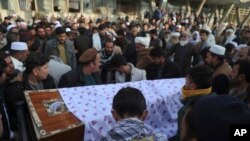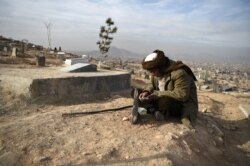The United Nations said Tuesday that civilian deaths and injuries in Afghanistan declined by 15% last year but surged in the final three months after peace talks between the government and Taliban insurgents began in September.
In its annual report documenting casualties, the U.N. Assistance Mission in Afghanistan (UNAMA) said that instead of helping alleviate the scale of civilian harm, the so-called intra-Afghan peace negotiations led to an escalation of violence with “disturbing trends and consequences.”
UNAMA said that civilian casualties increased by 45% in the fourth quarter of last year in comparison to the same period in 2019. The number of civilians killed and injured in November was the highest of any November since the mission began systematically documenting Afghan casualties 12 years ago.
Toward the end of the year, Afghans were confronted with a spate of targeted killings of civilians, aimed largely at media, civil society, judiciary and government workers, as well as family members of security forces. Afghan and U.S. officials blamed the Taliban for being behind the violence -- charges the insurgent group consistently has denied.
The U.N. report noted that the overall number of civilian casualties for all of 2020 stood at 8,820, below 10,000 for the first time since 2013. UNAMA has documented nearly 111,000 Afghan civilian casualties, including more than 35,500 deaths, since the mission began documenting the civilian harm in 2009.
“2020 could have been the year of peace in Afghanistan. Instead, thousands of Afghan civilians perished due to the conflict,” said UNAMA chief Deborah Lyons.
The report comes a day after Taliban and Afghan government peace negotiators returned to talks in Qatar, ending a month-long breakdown in the process. The development has raised hopes the two foes can negotiate a reduction in hostilities to prevent more bloodshed in the coming Afghan spring fighting season.
"Parties refusing to consider a cease-fire must recognize the devastating consequences of such a posture on the lives of Afghan civilians,” said Lyons. “I urge them not to squander a single day in taking the urgent steps to avoid more suffering.”
The intra-Afghan dialogue and overall reduction in civilian casualties are the outcome of a February 2020 agreement between the United States and Taliban.
The historic deal required that the U.S. military and the Taliban not attack each other, but the insurgents were not bound to stop attacks on Afghan government forces.
U.S. President Joe Biden’s administration is currently reviewing the deal to determine whether to withdraw the remaining 2,500 American soldiers in Afghanistan by the May 1 deadline as stipulated in the document.
The review was prompted by growing allegations that the insurgents have failed to meet commitments made in exchange for a pledge by Biden’s predecessor, Donald Trump, to withdraw all American soldiers from what has been the longest war in U.S. history.
UNAMA held the Taliban responsible for 45% of civilian casualties in 2020 while another 17% were blamed on militants linked to Islamic State as well as other local and foreign anti-government groups operating in Afghanistan.
Afghan government forces, including pro-government armed groups, were responsible for 25% of all civilian casualties, according to the report.
The report said that civilian casualties caused by U.S.-led international forces dropped to a record low in 2020, decreasing by 85% compared to the previous year and representing just over one percent of the number of Afghan civilians killed and injured.
The U.N. report attributed the rest of the casualties to “undetermined” Afghan security forces, anti-government groups, cross-fire as well as leftover unexploded materials in civilian areas.
The Taliban rejected UNAMA’s report, alleging it was “solely compiled and released on the basis of information” provided to the mission by Afghan government security institutions. It went on to say the U.N. office had shared in advance a draft of its report with the Taliban and the final document ignored “the concerns, precise information and accurate details” the insurgent group had shared with the mission.





